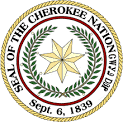Nanyehi (Nancy Ward) Beloved Woman of the Cherokee: Sorting Fact from Fiction
This article is by Kathie Forbes, an excellent genealogical and historical researcher with special skills in researching Cherokee ancestry. This article was written in response to a wikitree profile for Nancy Ward that was full of inaccuracies.
“Nancy Ward” -- there is tons of stuff about her on the Internet (and Wikitree), most of it wildly inaccurate. There is a lengthy Wikipedia article which is pretty accurate, although the accompanying portrait of a young Cherokee woman is not her -it’s a portrait of an unknown Cherokee woman by George Catlin drawn about 1838. The best source for accurate information is the biography written by David K. Hampton, genealogist, researcher, and president of the Association of Descendants of Nancy Ward. Nancy Ward’s activities are recorded in numerous historical records and her descendants are extremely well documented since she is probably the most well-known Cherokee woman. The story regarding her husband, Kingfisher, and the Battle of Taliwa may be apocryphal – there is no contemporary record of those events.
Nan-ye-hi, the Cherokee woman commonly known as Nancy Ward, was probably born in the Cherokee town of Chota, in what is now Monroe County, Tennessee, about 1738. She was a member of the Wolf clan and member of a family prominent in Cherokee politics. Nan-ye-hi's parents' names are not known, but her mother was a member of the Wolf Clan. Some accounts state that her father was a Delaware Indian. [Hampton, David K. Cherokee Mixed-Bloods. ARC Press of Cane Hill, Lincoln, Arkansas. 2005 pp. 103-107] She had one brother, named Tiskyteehee (Longfellow), who died in 1836 with no issue. Nancy’s family included two uncles, Attacullaculla (Little Carpenter) and Willenawa (Great Eagle), both prominent chiefs. By some accounts Attacullaculla was captured from a northern tribe as a child and therefore may not be a blood relative.
A fictional account of her life, written in 1895 by E. Sterling King, entitled The Wild Rose of the Cherokee, translates her name as 'Wild Rose', calls her “Pocahontas of the West,” and gives her mother's name as 'Tame Doe,' but there is no evidence for any of this. That book has resulted in a great deal of mythology about her. Nan-ye-hi was a common name for Cherokee women, frequently anglicized to Nancy.
According to Emmet Starr, Cherokee historian and genealogist, Nan-ye-hi married a member of the Deer Clan named Tsu-la, or Kingfisher about 1751. They had two children, a daughter, Ka-ti, and a son, Hiskyteehee (Fivekiller). Ka-ti (c.1752- c.1828) had 9 children by three different white men (Samuel Candy, John Walker, and Ellis Harlan). Fivekiller (c. 1755- bef. 1826) and his Cherokee wife, also named Ka-ti, died without issue.
According to legend, Nan-ye-hi accompanied her husband, Kingfisher, to battle during the Creek War about 1755. When he was killed, Nan-ye-hi took up his rifle and continued to fight. This earned her the title of "War Woman." She was later given the title of Ghigau, or "Beloved Woman, " a position of power and authority in the tribe. [Starr, Emmett. History of the Cherokee Indians and Their Legends and Folklore Warden Company, Oklahoma City, OK, 1921] pp. 468-471 and others
Nan-ye-hi subsequently married a white trader named Bryan[t] Ward, and became commonly known as Nancy Ward. They had one child, a daughter named Betsy, who was General Joseph Martin's Cherokee wife. Betsy had three children, two by Joseph Martin and one by a man named Hughes. Little is known with certainty about Bryan Ward. He had a white wife, named Ann, and a son named John (Jack) Ward, who married a Cherokee woman and fathered an unrelated Ward line.
Nan-ye-hi is credited with warning white settlers of raids and with saving the lives of white captives in the 1770's. She is listed with the Daughters of the American Revolution for patriotic service. [DAR Research System Nancy Ward, Ancestor #: A120623] She was a continuing voice in the tribe for peace with the whites, addressing the United States treaty commissioners at the Hopewell in 1785. [War Woman of Chota to the Treaty Commissioners, 23 Nov 1785, American State Papers, Class 2: Indian Affairs, 2 vols. (Washington DC: Gales and Seaton, 1832) I:4 ]. She continued to participate in the affairs of the Cherokee Nation at least until 1819. In 1817 she signed a memorial protesting the cession of Cherokee lands to whites along with her daughter, Ka-ti, granddaughter Jennie McIntosh, and several other women. [Cumber, Cynthia. Nan-ye-hi (Nancy Ward) Diplomatic Mother. Chapter 1 of Tennessee Women: Their Lives and Times University of Georgia Press, Athens, Georgia, 2009.]
Nan-ye-hi died at Womankiller Ford, near Benton, Tennessee, in 1824 and is buried nearby. A great-grandson, Jack Hilderbrand, recalled the circumstances of her death in 1908. Her brother and her son are buried near her. Her grave is maintained by the Nancy Ward Chapter of the DAR.
